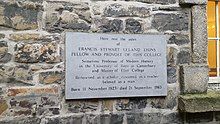F. S. L. Lyons
F. S. L. Lyons | |
|---|---|
| 40th Provost of Trinity College Dublin | |
| In office 1 August 1974 – 1 August 1981 | |
| Preceded by | Albert Joseph McConnell |
| Succeeded by | William Arthur Watts |
| Personal details | |
| Born | Francis Stewart Leland Lyons 11 November 1923 Derry, Northern Ireland |
| Died | 21 September 1983 (aged 59) Dublin, Ireland |
| Resting place | Trinity College Chapel |
| Spouse |
Jennifer Ann Stuart McAlister
(m. 1954) |
| Children | 2 |
| Education | Dover College, Kent The High School, Dublin |
| Alma mater | Trinity College Dublin |
Francis Stewart Leland Lyons FBA (11 November 1923 – 21 September 1983) was an Irish historian and academic who served as the 40th Provost of Trinity College Dublin from 1974 to 1981.[1]

Biography
[edit]Leland Lyons was born in Derry, Northern Ireland, in 1923, the son of Northern Bank official Stewart Lyons and Florence May, née Leland.[2] He was known as Le among his friends and family. The Lyons family were Irish Protestant, of Presbyterian and Church of Ireland background, descended from a cadet branch of the landed gentry Lyons family, formerly of Old Park, Belfast,[3] After his birth, his family soon moved to Boyle, County Roscommon, Ireland. He was educated at Dover College in Kent and later attended The High School, Dublin.[1] At Trinity College Dublin, he was elected a Scholar in Modern History and Political Science in 1943.[4]
He was a lecturer in history at the University of Hull and then at Trinity College Dublin. He became the founding Professor of Modern History at the University of Kent in 1964,[4][5] serving also as Master of Eliot College from 1969 to 1972.[6]
Lyons became Provost of Trinity College Dublin in 1974, but, relinquished the post in 1981 to concentrate on writing. He won the Heinemann Prize in 1978 for his work in Charles Stewart Parnell. He wrote Culture and Anarchy in Ireland, 1890–1939 which won the Christopher Ewart-Biggs Memorial Prize and the Wolfson Literary Prize for History in 1979. Lyons was also awarded honorary doctorates by five universities and had fellowships at the Royal Society of Literature and the British Academy. He was Visiting Professor at Princeton University.[4]
His principal works include Ireland Since the Famine, the standard university textbook for Irish history from the mid-19th to late-20th century, which The Times called "the definitive work of modern Irish history" and a biography of Charles Stewart Parnell.[1]
Lyons was critical of Cecil Woodham-Smith's much-acclaimed history of the Great Irish Famine and has generally been considered among the "revisionist" historians who reconsidered the role of the British state in events like the Famine.[7]
Lyons married his wife Jennifer Ann Stuart McAlister[8] in 1954, and had two sons,[9] one of whom, Nicholas, is a former Lord Mayor of London. Following a short illness, Lyons died in Dublin in 1983, just shy of his 60th birthday.[1]
Bibliography
[edit]- Lyons, F. S. L. (1951). The Irish Parliamentary Party, 1890-1910.
- — (1960). The fall of Parnell, 1890-91. London: Routledge and Kegan Paul.
- Internationalism in Europe 1815-1914 (1963)
- John Dillon: A Biography (1968)
- Ireland Since the Famine (1971)
- Charles Stewart Parnell (1977)
- Culture and Anarchy in Ireland, 1890–1939 (1979) - won the Christopher Ewart-Biggs Memorial Prize
References
[edit]- ^ a b c d "Professor F. S. L. Lyons – Perceptive Irish Historian". The Times. 24 September 1983. p. 10.
- ^ https://www.dib.ie/biography/lyons-francis-stewart-leland-a4972 [bare URL]
- ^ "Burke's Landed Gentry of Ireland 1958". Archived from the original on 25 February 2023. Retrieved 25 February 2023.
- ^ a b c Ulster History Circle. "Lyons, Francis Stewart Leland 1923-1983". Dictionary of Ulster Biography. Archived from the original on 9 December 2007. Retrieved 9 August 2007.
- ^ Townshend, Charles. "Lyons, (Francis Stewart) Leland (1923–1983)", revised, Oxford Dictionary of National Biography, Oxford University Press, 2004
- ^ Martin, Graham. From Vision to Reality: the Making of the University of Kent at Canterbury, University of Kent at Canterbury, 1990, pg. 259; ISBN 0-904938-03-4
- ^ James S. Donnelly Jr, The Great Famine and its interpreters, old and new Archived 2 April 2015 at the Wayback Machine, historyireland.com; accessed 12 February 2016.
- ^ https://www.dib.ie/biography/lyons-francis-stewart-leland-a4972 [bare URL]
- ^ "LYONS, Prof. Francis Stewart Leland". Who's Who & Who Was Who. Vol. 2024 (online ed.). A & C Black. (Subscription or UK public library membership required.)
- 1923 births
- 1983 deaths
- Academics of the University of Kent
- Christopher Ewart-Biggs Memorial Prize recipients
- Fellows of the British Academy
- Fellows of the Royal Society of Literature
- Historians from Northern Ireland
- 20th-century Irish historians
- Irish writers
- Male non-fiction writers from Northern Ireland
- People educated at The High School, Dublin
- Scholars and academics from Derry (city)
- People from Boyle, County Roscommon
- Provosts of Trinity College Dublin
- Revisionist historians (Ireland)
- Scholars of Trinity College Dublin
- Historians of the Land War
- Irish expatriates in the United Kingdom
- Scholars and academics from County Roscommon
- Wolfson History Prize winners
